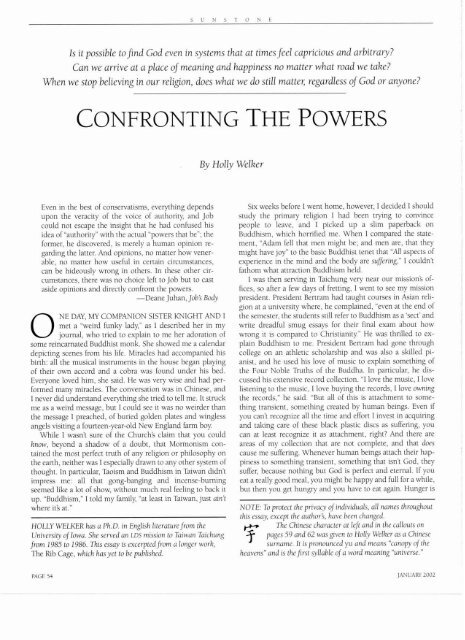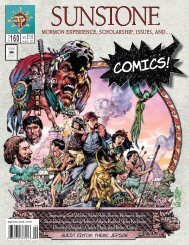Eugene England - Sunstone Magazine
Eugene England - Sunstone Magazine
Eugene England - Sunstone Magazine
You also want an ePaper? Increase the reach of your titles
YUMPU automatically turns print PDFs into web optimized ePapers that Google loves.
Is it possible tofind God even in systems that at timesfeel capricious and arbitrary?<br />
Can we arrive at a place of meaning and happiness no matter what road we take?<br />
When we stop believing in our religon, does what we do still mattel; regardless of God or anyone?<br />
CONFRONTING THE POWERS<br />
By Holly Welker<br />
Even in the best of conservatisms, everything depends<br />
upon the veracity of the voice of authority, and Job<br />
could not escape the insight that he had confused his<br />
idea of "authority" with the actual "powers that be"; the<br />
former, he discovered, is merely a human opinion regarding<br />
the latter. And opinions, no matter how venerable,<br />
no matter how useful in certain circumstances,<br />
can be hideously wrong in others. In these other circumstances,<br />
there was no choice left to Job but to cast<br />
aside opinions and directly confront the powers.<br />
-Deane Juhan,JobS Body<br />
0<br />
NE DAY, MY COMPANION SISTER KNIGHT AND 1<br />
met a "weird funky lady," as I described her in my<br />
journal, who tried to explain to me her adoration of<br />
some reincarnated Buddhist monk. She showed me a calendar<br />
depicting scenes from his life. Miracles had accompanied his<br />
birth: all the musical instruments in the house began playlng<br />
of their own accord and a cobra was found under his bed.<br />
Everyone loved him, she said. He was very wise and had performed<br />
many miracles. The conversation was in Chinese, and<br />
I never did understand everything she tried to tell me. It struck<br />
me as a weird message, but I could see it was no weirder than<br />
the message I preached, of buried golden plates and wingless<br />
angels visiting a fourteen-year-old New <strong>England</strong> farm boy<br />
While I wasn't sure of the Church's claim that you could<br />
know, beyond a shadow of a doubt, that Mormonism contained<br />
the most perfect truth of any religion or philosophy on<br />
the earth, neither was I especially drawn to any other system of<br />
thought. In particular, Taoism and Buddhism in Taiwan didn't<br />
impress me: all that gong-banging and incense-burning<br />
seemed like a lot of show, without much real feeling to back it<br />
up. "Buddhism," I told my family, "at least in Taiwan, just ain't<br />
where it's at."<br />
HOLLY WELKER has a Ph.D. in English literaturefrom the<br />
University of Iowa. She sewed an LDS mission to Taiwan Taichung<br />
from 1985 to 1986. This essay is excerptedfrom a longer work,<br />
The Rib Cage, which has yet to be published.<br />
Six weeks before I went home, however, I decided I should<br />
study the primary religion I had been trylng to convince<br />
people to leave, and I picked up a slim paperback on<br />
Buddhism, which homfied me. When I compared the statement,<br />
"Adam fell that men might be; and men are, that they<br />
might have joy" to the basic Buddhist tenet that "All aspects of<br />
experience in the mind and the body are suffering," I couldn't<br />
fathom what attraction Buddhism held.<br />
I was then serving in Taichung very near our mission's offices,<br />
so after a few days of fretting, I went to see my mission<br />
president. President Bertram had taught courses in Asian religion<br />
at a university where, he complained, "even at the end of<br />
the semester, the students still refer to Buddhism as a 'sect' and<br />
write dreadful smug essays for their final exam about how<br />
wrong it is compared to Christianity." He was thrilled to explain<br />
Buddhism to me. President Bertram had gone through<br />
college on an athletic scholarship and was also a skilled pianist,<br />
and he used his love of music to explain something of<br />
the Four Noble Truths of the Buddha. In particular, he discussed<br />
his extensive record collection. "I love the music, I love<br />
listening to the music, I love buylng the records, I love owning<br />
the records," he said. "But all of this is attachment to something<br />
transient, something created by human beings. Even if<br />
you can't recognize all the time and effort I invest in acquiring<br />
and taking care of these black plastic discs as suffering, you<br />
can at least recognize it as attachment, right? And there are<br />
areas of my collection that are not complete, and that does<br />
cause me suffering. Whenever human beings attach their happiness<br />
to something transient, something that isn't God, they<br />
suffer, because nothing but God is perfect and eternal. If you<br />
eat a really good meal, you might be happy and full for a while,<br />
but then you get hungry and you have to eat again. Hunger is<br />
NOTE: To protect the privacy of individuals, all names throughout<br />
this essay, except the author's, have been changed.<br />
The Chinese character at left and in the callouts on<br />
pages 59 and 62 war given to Holly Welker as a Chinese<br />
surname. It is pronounced yu and means "canopy of the<br />
heavens" and is thefirst syllable of a word meaning "universe."<br />
PAGE 54 JANUARY 2002

















